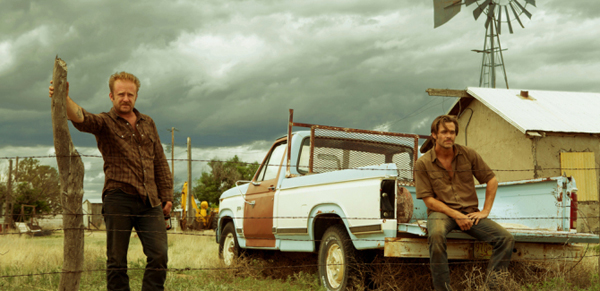
Catching Up on 2016: Josh Reviews Hell or High Water
In David Mackenzie’s film Hell or High Water, Chris Pine and Ben Foster star as brothers robbing small banks across Texas, while Jeff Bridges plays the Texas Ranger determined to catch them. The film explores the poverty rampant across Texas (and so much of the U.S. these days), and as the story develops we understand that the boys are robbing branches of Texas Midland Bank in an effort to get payback for what they see as the wrongs that bank, which is about to foreclose on their late mother’s ranch, has done to them and to others across Texas.
I was not prepared for what a powerhouse film this would be. The idea of Robin Hood-like bank-robbers is a familiar one, as is the structure of following both the breaking-the-law bandits and the police officer(s) chasing them. But there is so much more to Hell and High Water than just that.
First and foremost, the film is a blisteringly angry picture of the state of so many communities these days, feeling left behind my modernity and globalization, and with the gap between the haves and the have-nots widening into a seemingly unbreachable gulf. But like a well-mannered Southern gentleman, the film doesn’t convey this anger through hysterics or big speeches. No, so much of the film’s message is conveyed in simple, quiet imagery of the Texas towns in which the film is set, with the “get out of debt” signs everywhere and the striking images of run-down cars and run-down homes. This is a film with a broken heart, and by the end the audience will feel that too.
Secondly, the film is a wonderful character study. Both Chris Pine and Ben Foster do the best work of their careers. Chris Pine first came to my attention — and so everyone else’s — in his role of Captain Kirk in J.J. Abrams’ Star Trek reboot. There’s no question that Mr. Pine is a movie star, but Hell or High Water proves that he’s a great ACTOR. I loved the quiet, understated way he played Toby. I knew Ben Foster, meanwhile, only from his role of Warren Worthington/Angel from the disappointing X-Men: The Last Stand. I’d heard that he had developed into a great actor but I don’t think I’ve seen any of his films from the past decade. But now I know what people meant, because he’s dynamite here as Tanner, Toby’s louder, more reckless brother. In lesser hands these two characters could have been cliches, but Mr. Pine and Mr. Foster bring them to life with great depth and dignity. I love their chemistry together. These brothers are oil and water in many ways, and yet we also see their connection. Their last scene together in the movie could be my very favorite scene.
But while Mr. Pine and Mr. Foster are both super, this movie belongs to Jeff Bridges. Mr Bridges plays what on paper is a supporting role, as Marcus Hamilton, the elderly Texas Ranger on the trail of the young bank robbers Toby and Tanner. But Mr. Bridges takes what’s on the page and explodes through the screen, creating an incredible, instantly iconic character. I adore this character, a stubborn, tough, funny, whip-smart old bird. There are shades of Tommy Lee Jones’ character in No Country For Old Men in the character, as well as Mr. Bridges’ own mumbling performance as Rooster Cogburn in the Coen Brothers’ True Grit. But it all comes together here in a new concoction that commands the audience’s attention every second that Mr. Bridges is on-screen. This performance is the reason to see this movie.
Gil Birmingham (terrific as Jacqueline Vorhees’s father on Unbreakable Kimmy Schmidt) is great as Alberto Parker, Marcus’ partner. The character is reminiscent of Gomez, Hank’s partner on Breaking Bad, but as with every other performer in the film, Mr. Birmingham brings what could have been a cliche role to wonderful life. He and Mr. Bridges are tremendous fun on-screen together.
The film is filled with moments and images showing life for the have-nots in Texas. The friendly waitress who has a mortgage she can’t afford. The young girl working as a bank teller. The crotchety old woman serving T-bone steaks and nothing else. In many ways, it seems to me that these moments are the central narrative through-line of the film, it’s very reason for being, even more than the main story of brothers Toby and Tanner’s bank-robbing caper.
As the story was unfolding, my mind was racing ahead to wonder how the story would end. The challenge in ending this type of film, focusing on outlaws breaking the law, is that on the one hand, you don’t want to lift them up too much into heroes, but on the other hand, even if the audience knows that this story probably won’t end well, you don’t want the ending to be too jump-off-a-roof depressing. I’m impressed that screenwriter Taylor Sheriden found the exactly perfect way to end. That last scene in particular is magnificent.
I wasn’t expecting how emotionally affecting and gripping Hell of High Water would be. The film is fun and funny, and also deeply moving. It’s a gripping yarn and also a film with an important underlying message and reason for telling this particular story. I loved it. It was one of my very favorite films of 2016.
